 Today is Valentine’s Day and everyone is thinking about love stories.
Today is Valentine’s Day and everyone is thinking about love stories.
Not necessarily romance novels, mind you, but love stories. The stories that last. The ones that endure.
We all have them, names that instantly spring to mind when someone mentions the word love.
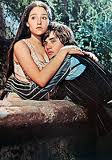 The names “Romeo and Juliet” always invoke the image of star-crossed lovers. Shakespeare’s story lives for the ages. It’s ironic that one of the best known images of romance is about a love story that ends tragically.
The names “Romeo and Juliet” always invoke the image of star-crossed lovers. Shakespeare’s story lives for the ages. It’s ironic that one of the best known images of romance is about a love story that ends tragically.
I’d prefer to look at three of my favorite fictional couples whose pages I return to because they either end happily, or they show no sign of ending at all.
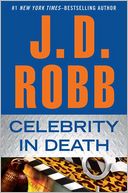 I’ve never made any secret of following the adventures of Eve Dallas and Roarke. One of the things I enjoy most about the series is that the stories show a strong relationship between a married couple that continues to throw off hot sexual sparks well after they tie the knot. The author has managed to make married life interesting. If this were a TV series, the wedding would have ended the show. But with Eve and Roarke, the continued influx of homicide investigations into her squad room just means more interesting cases for Eve to solve–and more peeks into Eve and Roarke’s evolving relationship. Readers still don’t know the man’s first name, but we continue to be fascinated, 33 books and counting. Celebrity in Death, book 34 is coming on February 21. I’m already planning to stay up and read it.
I’ve never made any secret of following the adventures of Eve Dallas and Roarke. One of the things I enjoy most about the series is that the stories show a strong relationship between a married couple that continues to throw off hot sexual sparks well after they tie the knot. The author has managed to make married life interesting. If this were a TV series, the wedding would have ended the show. But with Eve and Roarke, the continued influx of homicide investigations into her squad room just means more interesting cases for Eve to solve–and more peeks into Eve and Roarke’s evolving relationship. Readers still don’t know the man’s first name, but we continue to be fascinated, 33 books and counting. Celebrity in Death, book 34 is coming on February 21. I’m already planning to stay up and read it.
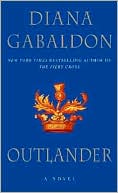 Diana Gabaldon’s Outlander was not initially marketed as a romance. It was sold as historical fiction, and considering the amount of research that goes into each volume of the series, that’s probably the right place for it. Yet the core of the stories (7 doorstop sized books and counting) is the century-spanning love story of Jamie Fraser and Claire Randall. Claire is the daughter of the 20th century, and Jamie the son of Scotland in the time of Bonnie Prince Charlie. Yet magic, or fate, brings them together.
Diana Gabaldon’s Outlander was not initially marketed as a romance. It was sold as historical fiction, and considering the amount of research that goes into each volume of the series, that’s probably the right place for it. Yet the core of the stories (7 doorstop sized books and counting) is the century-spanning love story of Jamie Fraser and Claire Randall. Claire is the daughter of the 20th century, and Jamie the son of Scotland in the time of Bonnie Prince Charlie. Yet magic, or fate, brings them together.
 While I enjoy the story of Jamie and Claire’s first romance, it’s not what draws me back. My copy of Voyager opens automatically to Part Six, Chapter 24. I’ve read over and over the part where Claire takes her courage, and her life, in both hands and risks the standing stones to go back to Jamie, back two centuries in time, knowing that he survived the disaster at Culloden, but having no idea what changes the intervening 20 years have wrought in his life. All she knows is that she must tell him that he has a daughter. But she really wants to be his wife again, and has no clue whether he still loves her as she has never stopped loving him.
While I enjoy the story of Jamie and Claire’s first romance, it’s not what draws me back. My copy of Voyager opens automatically to Part Six, Chapter 24. I’ve read over and over the part where Claire takes her courage, and her life, in both hands and risks the standing stones to go back to Jamie, back two centuries in time, knowing that he survived the disaster at Culloden, but having no idea what changes the intervening 20 years have wrought in his life. All she knows is that she must tell him that he has a daughter. But she really wants to be his wife again, and has no clue whether he still loves her as she has never stopped loving him.
 My other favorite is from Dorothy Dunnett’s Lymond Chronicles. Again, this is historical fiction of the intensely researched and amazingly complicated school. The Lymond Chronicles are about a young man named Francis Crawford of Lymond, the second son of the Earl of Midculter and his wife Lady Sybilla. Francis Crawford is many things over the course of the six books of this saga, an outlaw and a spy and a mercenary and a drug addict and a diplomat and a fool. But always he is a Scottish patriot at a time when Scotland was a small and independent country playing her chief rivals, France and England, off against each other in the hopes of retaining that independence. In the mid-1500’s, that time was running out.
My other favorite is from Dorothy Dunnett’s Lymond Chronicles. Again, this is historical fiction of the intensely researched and amazingly complicated school. The Lymond Chronicles are about a young man named Francis Crawford of Lymond, the second son of the Earl of Midculter and his wife Lady Sybilla. Francis Crawford is many things over the course of the six books of this saga, an outlaw and a spy and a mercenary and a drug addict and a diplomat and a fool. But always he is a Scottish patriot at a time when Scotland was a small and independent country playing her chief rivals, France and England, off against each other in the hopes of retaining that independence. In the mid-1500’s, that time was running out.
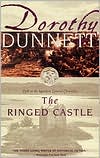 Crawford commits crimes and treasons, both great and small, in the service of his country. He lives his life believing that the ends always justify the means and he never counts the cost to his own soul. Until near the end of his story, when he finally discovers that there is a woman who has grown to be his equal. Philippa Somerville set herself the task of cleaning up Crawford’s messes and tending to his victims almost ten years previously, and has been following him around Europe ever since he wrongly accused her father of betraying him.
Crawford commits crimes and treasons, both great and small, in the service of his country. He lives his life believing that the ends always justify the means and he never counts the cost to his own soul. Until near the end of his story, when he finally discovers that there is a woman who has grown to be his equal. Philippa Somerville set herself the task of cleaning up Crawford’s messes and tending to his victims almost ten years previously, and has been following him around Europe ever since he wrongly accused her father of betraying him.
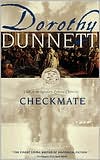 But when they started, Philippa was a precocious 12-year-old, and Crawford was only 19. Both of them much too young for Crawford to declare at 29 that it was too late for him to love anyone. That he had seen too much and done too much for him to be worthy of love, or of being loved. Three scenes I come back to, over and over. The one in The Ringed Castle where Crawford realizes that Philippa is not the child he remembers, but a woman who has played music for kings and comforted queens, and is fully his equal, and that he loves her. Then he returns to his home and locks all his feelings away because he feels unworthy. The night of the rooftop chase in Checkmate, when Philippa realizes that she loves Lymond, and feels rejected because she offered to share friendship, and he turns from her when she shows that she feels more. And last but not least, the conclusion at the end of Checkmate, when the prophecy from the opening of The Game of Kings is fulfilled.
But when they started, Philippa was a precocious 12-year-old, and Crawford was only 19. Both of them much too young for Crawford to declare at 29 that it was too late for him to love anyone. That he had seen too much and done too much for him to be worthy of love, or of being loved. Three scenes I come back to, over and over. The one in The Ringed Castle where Crawford realizes that Philippa is not the child he remembers, but a woman who has played music for kings and comforted queens, and is fully his equal, and that he loves her. Then he returns to his home and locks all his feelings away because he feels unworthy. The night of the rooftop chase in Checkmate, when Philippa realizes that she loves Lymond, and feels rejected because she offered to share friendship, and he turns from her when she shows that she feels more. And last but not least, the conclusion at the end of Checkmate, when the prophecy from the opening of The Game of Kings is fulfilled.
Lymond was prophesied that he want two things, one he would have, and one he would not, nor was it right that he should. The answers are love, and his birthright. The story is everything.
What are your favorite love stories for Valentine’s Day?
 Memorial Day in the United States is a holiday that is intended to honor those who have fallen in the service of the United States while wearing the uniform of one of its Armed Forces. The Wall of the Vietnam Veterans Memorial, pictured above, commemorates that fact starkly, listing the names of those who fell.
Memorial Day in the United States is a holiday that is intended to honor those who have fallen in the service of the United States while wearing the uniform of one of its Armed Forces. The Wall of the Vietnam Veterans Memorial, pictured above, commemorates that fact starkly, listing the names of those who fell.








